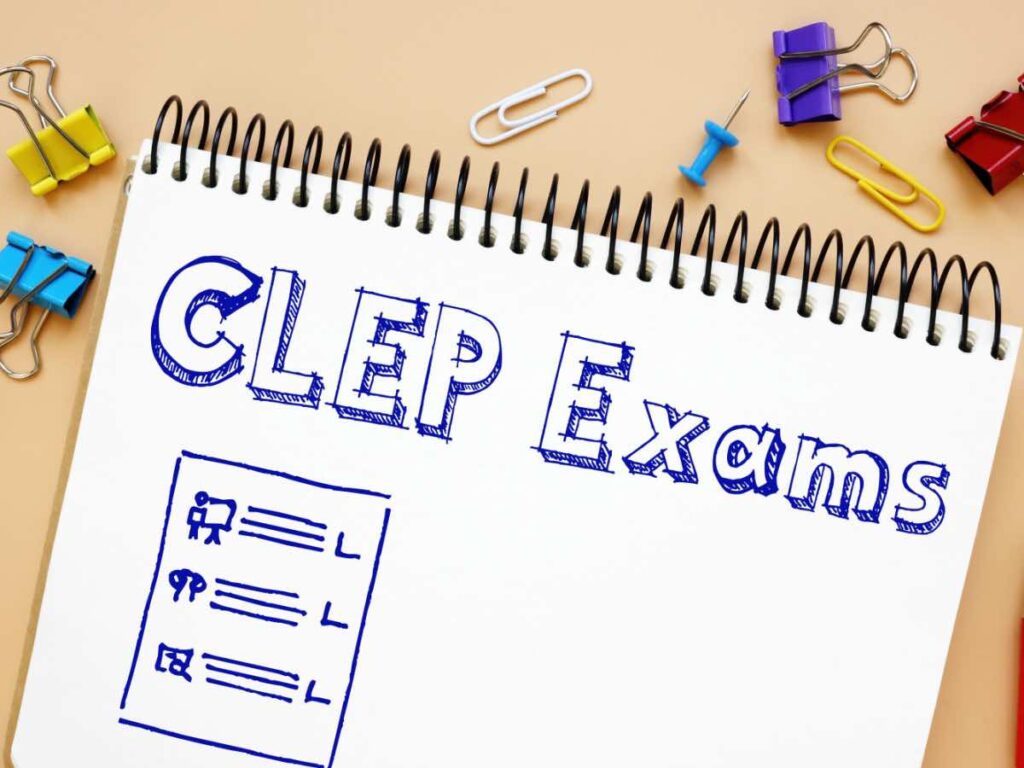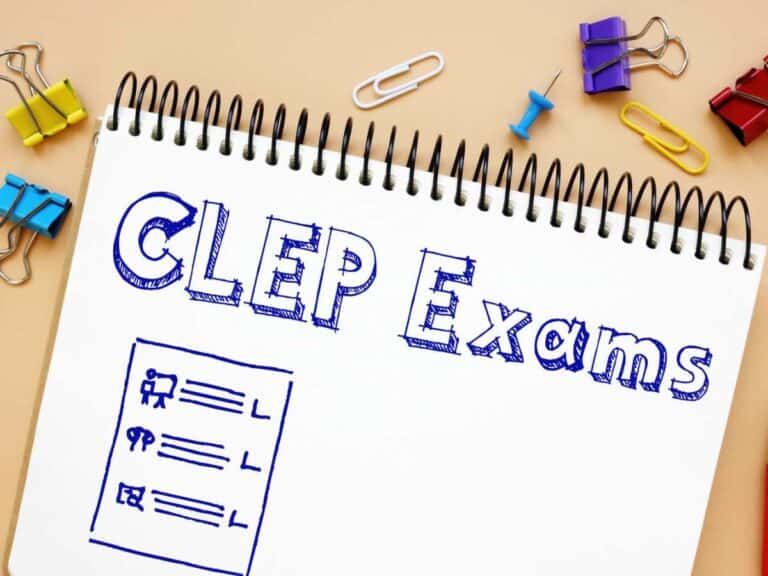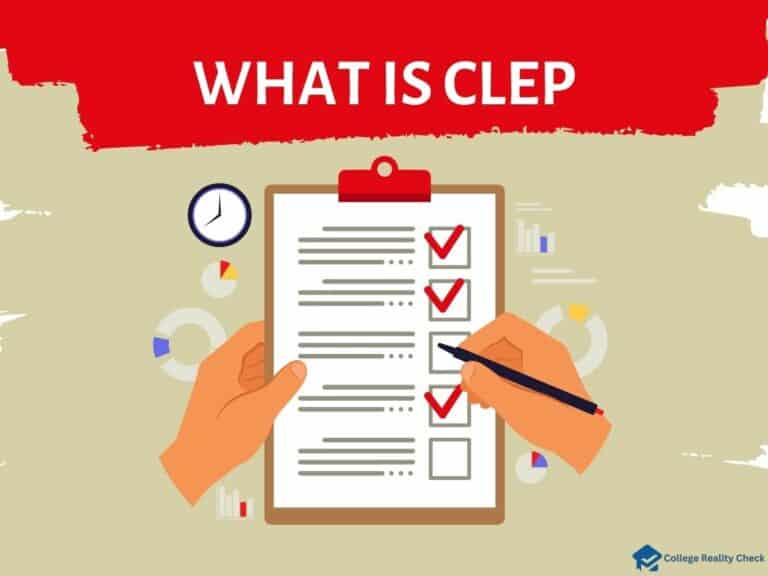Can You Get an Entire Bachelor’s Degree With CLEP?
Besides Advanced Placement (AP) exams, there are other tests the College Board also administers: College-Level Examination Program (CLEP) exams.
Each test allows students to earn anywhere from 3 to 12 college credits, depending on the difficulty level.
Since there are 34 exams to choose from, is it possible to get a degree by taking CLEP exams alone?
Although CLEP exams let students earn credits for introductory courses so that they can complete an undergraduate program faster than their peers, it does not allow test-takers to earn an entire bachelor’s degree. Colleges limit the number of CLEP tests students can earn credit for.
Also, there are no CLEP exams for advanced courses.
Read on if you are planning on registering for CLEP exams so that you can be in and out of college much faster.
Everything you need to know about CLEP exams, from the cost of taking them to the number of credits universities accept and which colleges accept CLEP exams, will be discussed below.

What are CLEP Exams?
CLEP exams are standardized tests created and administered by the College Board, which is the same non-profit organization behind AP and SAT exams. CLEP tests enable students to earn college credits for introductory courses — how many credits they can earn will depend on the scores set by schools accepting CLEP exams.
It was in 1967 when CLEP was launched. Originally, it was intended to enable adult learners and military service members to obtain college degrees at a reasonable cost minus them missing their family and work responsibilities.
Since it came into being, the program has been taken by more than 6 million people.
One of the nicest things about taking CLEP exams is that it allows students to earn college credits — as mentioned earlier, for every examination taken, a test-taker can earn anywhere from 3 to 12 college credits.
How many credits exactly a student can earn will depend on factors such as the exam’s difficulty level and the number of CLEP credits an institution accepts.
Because it allows college-bound students to earn college credits, needless to say, the length of time necessary for them to complete their undergraduate degree program can be considerably cut short.
Here’s an estimate of the number of months you can save by taking CLEP exams:
- Associate degree – 1 and a half months to 4 and a half months
- Bachelor’s degree – 2 and a half months to a little over 10 months
Of course, it will depend on how many credits a student earns by taking CLEP exams. And, more importantly, it will depend on the college to be attended — different schools have different policies when it comes to awarding CLEP credits.
And speaking of CLEP credits, let’s answer this burning question in the minds of many CLEP test-takers…
Do CLEP credits expire?
CLEP credits, technically speaking, do not expire. However, it’s important to keep in mind that the College Board keeps CLEP transcripts on record only for 20 years after initial testing.
Failure to send a CLEP transcript to the institution after the said time period may keep the student from earning CLEP credits. Also, getting old CLEP exam scores can be complicated.
What are CLEP Tests Like?
The SAT, which is also by the College Board just like CLEP, comes in the form of traditional paper format tests and can be completed in about 3 hours — or 3 hours and 15 minutes with breaks.
However, soon enough the SAT will be administered digitally and will be shorter, too!
CLEP exams, on the other hand, have always been computerized. But just like SAT takers, CLEP takers also have to answer a variety of multiple-choice questions, which amount to approximately 120 questions.
And because CLEP tests are computer-based, test-takers receive their test scores as soon as they are through answering.
By the way, here is the list of the easiest CLEP exams.
The scores for college composition and Spanish with writing sections of CLEP, of course, become available later as they are graded by humans. Typically, the results of CLEP writing sections are available 2 to 3 weeks from the test date.
According to the College Board itself, the development of CLEP exams and the establishment of test standards are done by more than 600 college faculty members from various regions of the US.
And the first step they take is the conduction of a curriculum survey to obtain information on current college curricula and the latest trends in various subjects.
So, how do you study for CLEP tests?
The administrator of CLEP exams, which is the College Board, offers free study guides containing official CLEP test questions. It also allows test-takers to take advantage of cost-free resources by exam topic.
The general consensus is that most CLEP examinations require 1 to 2 hours of study daily or every other day for a month, depending on the difficulty level.

What are CLEP Exam Topics?
There are a total of 34 CLEP exams that cover introductory-level college course material. Topics come in 5 different categories: business, composition and literature, history and social sciences, science and mathematics, and world languages. Many of them can be used by students to work through gen ed requirements in college.
Just like what was pointed out earlier, only credits in introductory courses in college that students who take CLEP tests can earn, which is why earning a complete associate degree or bachelor’s degree through CLEP is unfeasible.
But college-bound teens can get many lower-level courses out of the way because there are many CLEP exam topics.
Needless to say, taking the right CLEP exams allows you to get your hands on an undergraduate degree as quickly and as cheaply as you can.
And to come up with the right strategy by registering for the right tests, the College Board recommends students consult their respective admission officers or academic advisers.
It’s also a good idea to carefully take a look at the detailed description of CLEP exams one wishes to take to avoid shelling out money for those that won’t help him or her move to more advanced college courses in no time.
Here’s a complete list of all CLEP tests according to various categories:
Business
- Financial Accounting
- Information Systems
- Introductory Business Law
- Principles of Management
- Principles of Marketing
Composition and Literature
- American Literature
- Analyzing and Interpreting Literature
- College Composition
- College Composition Modular
- English Literature
- Humanities
History and Social Sciences
- American Government
- History of the United States I
- History of the United States II
- Human Growth and Development
- Introduction to Educational Psychology
- Introductory Psychology
- Introductory Sociology
- Principles of Macroeconomics
- Principles of Microeconomics
- Social Sciences and History
- Western Civilization I
- Western Civilization II
Science and Mathematics
- Biology
- Calculus
- Chemistry
- College Algebra
- College Mathematics
- Natural Sciences
- Pre-Calculus
World Languages
- French Language (levels 1 and 2)
- German Language (levels 1 and 2)
- Spanish Language (levels 1 and 2)
- Spanish with Writing (levels 1 and 2)
So, are CLEP Exams Hard?
Well, as far as topics are concerned, some CLEP tests are harder than the rest. It’s exactly for this reason why some of them have longer examination lengths. But it’s important to consider, too, that a CLEP exam’s difficulty can be subjective since test-takers normally opt for topics they are knowledgeable about or interested in the best.
In any case, here’s a post that talks about some of the hardest CLEP exams.
How Much Do CLEP Exams Cost?
All CLEP tests cost $93 each. This is true for exams with writing sections. A CLEP exam can be equivalent to a minimum of 3 credits.
As of this writing, the average cost of a college course per credit is $694, which means that a 3-credit course can cost $2,082. Doing the math, a CLEP test allows a test-taker to save at least $1,992.
Like other tests created and administered by the College Board, CLEP exams don’t come free of charge.
As of this writing, the cost of a CLEP test amounts to $93. But be warned: according to the College Board itself, for the academic year 2023 to 2024, the CLEP exam fee will increase to $93.
However, in some states, CLEP exams can be cheaper or even free of charge for some high school students. Of course, those who are eligible for a discounted or free CLEP exam fee are from low-income backgrounds.
The cost of a CLEP exam in Michigan and West Virginia is $5 for poor high schoolers. On the other hand, it costs $0 in Ohio.
But it’s not just low-income high school students who can take CLEP exams cheaply or for free.
Military service members, including active duties, reserves and national guards receiving funding from the Defense Activity for Non-Traditional Education Support (DANTES) for the pursuit of their educational goals can sit for CLEP tests at no cost.
There’s no CLEP exam fee for them, however, only for the first attempt of each CLEP exam. In some instances, in addition, they may have to pay the administration fee a college asks for.
But it’s a good thing that military service members who are about to undergo CLEP tests may waive the administration if testing at a fully-funded test center.
Where You Can Take CLEP Exams
Students take CLEP exams at designated CLEP test centers. Official CLEP test centers can include colleges and universities as well as high schools, independent testing organizations and even military bases. However, it’s also possible for test-takers to undergo CLEP exams online through remote proctoring at home.
The College Board says that CLEP exams are administered at more than 1,800 test centers in and outside the US.
What’s so good about sitting for a CLEP test is that you can decide where you want to take it. So, in other words, taking it can be as hassle-free as possible as you can pick a test center that’s convenient for you.
It’s when students are registering for CLEP exams that they can opt for the test center of their liking and have its information printed on their registration tickets, too.
The website of CLEP has a test center search page that allows test-takers to locate test centers according to location as well as obtain additional details about their chosen test centers.
But other than heading to an official test center, you can also take CLEP with remote proctoring.
So, needless to say, there’s no other answer to pressing CLEP-related questions such as “can you take CLEP exams at home?” and “can you CLEP online?” but a resounding “yes!”
Unfortunately, just because you want a remote proctoring CLEP examination doesn’t necessarily mean that you can. As expected, there are some eligibility requirements to meet.
For instance, your testing room and computer must meet equipment and environment requirements and also Proctortrack technical requirements for remote proctoring.
Who Can Take CLEP Exams
Anyone who is 13 years old or older and interested in earning college credits to expedite the completion of an associate degree or a bachelor’s degree may take CLEP exams. They include high school and college students as well as adult learners and military service members and veterans. Professionals may take CLEP tests, too.
It’s not uncommon for many high school students to take AP exams not only to increase their chances of admission to selective schools but also to earn college credits, which can shorten and cheapen their postsecondary careers.
Sadly for other learners, they may not be eligible to sit for those.
College and other post-high school students, for instance, may take AP exams only if they can come across high schools that are more than willing to take them in.
The College Board, the one who is also behind CLEP, has not set an upper age limit for sitting for AP examinations — it’s just that not all high schools admit older AP test-takers.
But it’s a completely different story when it comes to taking CLEP tests. When registering, there’s no need to look for a test center that will admit you; you just have to look for a test center that will be most convenient for you to visit!
As mentioned earlier, anyone from a high schooler to an undergraduate student can undergo CLEP examinations.
Military service members and veterans are not going to have a difficult time registering for CLEP. Adult learners and adults going back to college are more than welcome to take CLEP tests.
As a matter of fact, even professional individuals who are seeking continuing education credits may also sit for CLEP exams.
Passing CLEP Test Scores
CLEP exam scores range from 20 to 80 points. The American Council of Education (ACE), which is the major coordinating body for all higher education institutions in the US, suggests a minimum passing score of 50, which is equivalent to a C, for every exam. A panel of college faculty, however, recommends a grade of B.
First things first: similar to the SAT, you cannot get a score of 0 on your CLEP exam — the lowest possible score that test-takers can get is 400 on the SAT and 20 on a CLEP examination.
Getting a score of 50 out of 80, typically, means that you pass your CLEP test.
The said figure is exactly what ACE recommends for students to get for them to earn college credits.
Most colleges and universities in the US that accept CLEP exams and give credits for them, too, follow the ACE-recommended credit-granting score. But then there are also postsecondary institutions that choose to set their own policies when granting CLEP credits.
Some of them, for instance, may opt to follow the recommendation of a panel of college faculty who teach the equivalent course, which is a scaled score that is equivalent to a B.
Let’s take a look at some CLEP exams and the passing score for each using the B-grade approach:
| CLEP Exam | Passing Score |
|---|---|
| American Literature | 53 |
| Biology | 56 |
| Chemistry | 66 |
| Financial Accounting | 65 |
| History of the United States I | 61 |
| History of the United States II | 60 |
| Human Growth and Development | 58 |
| Humanities | 55 |
| Introductory Business Law | 57 |
| Introductory Psychology | 55 |
| Natural Sciences | 66 |
| Principles of Macroeconomics | 62 |
| Principles of Microeconomics | 64 |
| Spanish with Writing (level 1) | 58 |
| Spanish with Writing (level 2) | 71 |
| Western Civilization I | 55 |
| Western Civilization II | 54 |
Planning on attending a school that follows the B-grade approach?
Then it means that you will have to get 3 more points than the recommended passing score of ACE to earn college credits for American Literature.
Meanwhile, you must not get more than 9 wrong answers in Spanish with Writing (level 2 proficiency) to pass and earn college credits for it.
Can you retake CLEP exams?
Students can retake CLEP exams until they get a passing score or one that they are satisfied with. As a matter of fact, they can sit for CLEP as many times as they like. However, test-takers may not retake a CLEP exam of the same title within 3 months of the initial testing date. Otherwise, their score will be canceled and test fees will be forfeited.
Whether or not you are happy with your CLEP test score, always make sure that you retake it after a 3-month period to avoid any complications.
And this brings us to another pressing question…
Do CLEP exams affect GPA?
While CLEP exams allow students to earn college credits, they do not affect their GPA. CLEP exams, however, appear on the transcript with a completed status.
Getting a failing score on a CLEP test and not being awarded college credits for it should also not be a cause of concern for the test-taker because it will not appear on his or her college transcript.
Do All Colleges Accept CLEP Exams?
The College Board itself says that there are over 2,900 colleges and universities in the US that grant credits for CLEP exams. However, not all institutions of higher education that accept CLEP award college credits for all tests. Similarly, different schools have different policies when it comes to awarding credit for CLEP tests.
Prior to registering for CLEP examinations for college credits, there’s one very important step you need to do: schedule a meeting with your admission officer or academic adviser to discuss the matter.
It’s for the fact that not all schools accept CLEP exams or give credit to each and every CLEP exam.
However, the good news is that, as mentioned above, more than 2,900 4-year institutions in the country accept CLEP tests and give credit for them, too. But it’s just that policies can vary from school to school.
For instance, College X may grant credit only if the student earns a particular grade on his or her CLEP test or College Y may accept only certain CLEP tests.
In any case, here are some colleges and universities known to accept CLEP examinations:
- Arizona State University
- Boise State University
- California State University
- Clemson University
- Colorado State University
- DePaul University
- Drexel University
- Elon University
- Excelsior College
- Florida State University
- Ohio State University
- Oregon State University
- Louisiana State University
- Michigan State University
- Mississippi State University
- New Mexico State University
- Northern Arizona University
- Pennsylvania State University
- Purdue University
- Texas A&M University
- Texas Tech University
- University of Central Florida
- University of Colorado
- University of Kentucky
- University of Massachusetts
- University of Utah
- Washington State University
- Western Governors University
Check here for the list of all top colleges that accept CLEP exams.
Disclaimer: The views and opinions expressed in this article are those of the authors and do not necessarily represent those of the College Reality Check.


